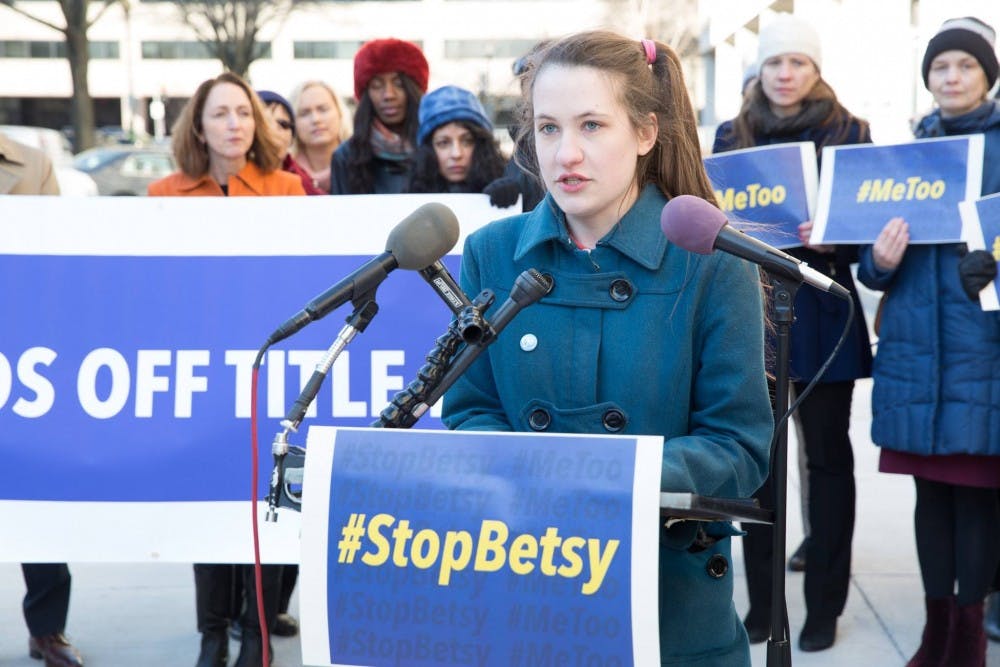Sophomore Madelynn Wellons, a survivor of sexual assault on Homewood campus, spoke out against Secretary of Education Betsy DeVos at a press conference on Jan. 25.
Wellons shared her story outside the Department of Education headquarters in support of SurvJustice, Equal Rights Advocates and the Victim Rights Law Center, three law firms who filed a lawsuit against DeVos.
The lawsuit alleges that the Department of Education discriminated against students who report sexual assault by rescinding the Dear Colleague Letter, an Obama-era guideline advising universities on how to address campus sexual assault.
In September, DeVos issued her highly controversial decision to rescind these guidelines.
One tenet of the guidelines was the suggested 60-day window to resolve cases of sexual assault. Wellons criticized the University for failing to address her case within this window.
“In December 2016, I reported my sexual assault and stalking and it is now February 2018 and I still have no hearing scheduled,” she said. “It’s making it a lot more difficult for survivors to speak out. It’s making it a lot more difficult for people to talk about these issues and for people to get their justice.”
In a post on Facebook, Wellons wrote that the University told her she “just isn’t a priority” after her efforts to confirm a hearing for her case.
The University’s Title IX Coordinator Joy Gaslevic could not comment directly on Wellons’ case under federal law and University policy, but she responded to Wellons’ post.
“The Office of Institutional Equity (OIE) considers every allegation and complaint a priority,” Gaslevic wrote in an email to The News-Letter. “The investigation process can sometimes take considerable time to ensure that cases are handled fairly.”
Junior Mayuri Viswanathan and senior Dani Pitkoff, the co-directors of the Sexual Assault Resource Unit (SARU), strongly condemned DeVos for rescinding the guidelines.
They said that this decision took away power from survivors to hold their universities accountable.
Viswanathan said that they were proud of Wellons and inspired by her choice to speak out, adding that her experience shows why it is important to challenge DeVos’ legislation.
“Broadly speaking, there have been repeated instances where cases have not been completed within the 60 day timeline,” she said. “The lack of enforcement for that requirement is definitely concerning because, in cases like [Wellons’], it doesn’t really give her much else to do or anywhere else to go.”
Soon after DeVos rescinded the guidelines in 2017, Vice Provost for Institutional Equity Kim Hewitt affirmed that the University would continue to observe its current policies regarding sexual assault, which largely conformed with the guidelines.
Pitkoff said that SARU wrote an open letter at the end of last semester encouraging the University to keep its existing policy despite the federal changes instituted by DeVos.
“We immediately went into crisis mode because we had to make sure that Johns Hopkins University held the old standards,” she said. “Through that effort we had the provost commit, right now at least, to following our current sexual assault policy.”
Carly Mee, a staff lawyer at SurvJustice who works with Wellons, said that DeVos’ decision prompted a lot of uncertainty.
“We just don’t know what has changed,” Mee said. “The guidance made things a lot less certain, and so we don’t know what schools are going to change. It unfortunately gave them the leeway to change a lot of different things.”
Viswanathan added that Wellons’ actions could give hope to other survivors of sexual assault.
“I know many other survivors on campus that have faced experiences similarly frustrating to hers who are really relying on the efforts of individuals like her in cases like this to advance and find justice for themselves,” she said. “Hopefully people can feel a little bit less alone and know that there are many other people out there who have not only experienced the same thing but are able to, with each other’s support, really come together to build strength and resiliency.”
According to Wellons, watching the #MeToo movement unfold during the fall of 2017 partially inspired her to speak out against DeVos.
As part of the #MeToo movement, survivors of sexual assault around the world shared their stories on social media with the hashtag #MeToo to show the extent to which sexual violence affects people in our society.
Wellons said that #MeToo showed her that she wasn’t alone.
“Before the #MeToo movement I never thought I would ever talk about this publicly because it just wasn’t a thing that was done very often,” Wellons said. “People were being punished to some degree for what they had done. I felt like speaking out about these kinds of issues could actually lead to some genuine change.”
Viswanathan said that survivors of sexual assault should not have to share their stories in order to create change.
“#MeToo was incredible in fostering solidarity and creating the environment in which those conversations could happen, but it is unfortunate that still the person that it happened to has to say #MeToo,” Viswanathan said.
Gaslevic wrote that the OIE has recently received more reports of sexual misconduct, which she explained may be in part due to the #MeToo movement and the OIE’s campus-wide training efforts.
Pitkoff said that she is constantly amazed by the bravery of those who speak out against sexual assault.
“I don’t think we can emphasize enough though how much [Wellons] is really raising up the voices of so many people on this campus,” she said.
She added that the OIE will release a campus climate survey, an opportunity for students to anonymously share their experiences.
The survey will collect information which will assist the University’s efforts surrounding sexual misconduct, prevention and education, according to Gaslevic.
She wrote that the survey seeks to better understand student perceptions of the problem of sexual assault on campus and gauge student awareness of the resources available to survivors.
“If someone is considering reporting, we strongly urge them to contact OIE to discuss reporting options, interim measures that may be available and appropriate, as well as on- and off-campus confidential and non-confidential resources,” Gaslevic wrote. “We want students to know that they can even have this initial OIE conversation anonymously.”
Gaslevic added that the OIE is focused on improving the process of addressing discrimination and harassment at the University and wrote that we need to work together.
“It’s on all of us at Hopkins to work together to make our community the best it can be,” she wrote. “OIE looks forward to working with the community to shape future sexual misconduct prevention and education efforts.”
She expanded upon the goals of OIE and called on students to help them enact change on Homewood Campus.
“OIE is focused on a daily basis to enhance the handling of discrimination and harassment matters at Hopkins — thus, we all share the same goal and need to work together to help solve the problem of sexual misconduct,” Gaslevic wrote.
Mee urged survivors to make use of the resources available to them, including those on-campus and community organizations which support survivors.
“Reach out to organizations like SurvJustice or others that can make this process feel less lonely and intimidating,” she said. “Not everyone has the support of parents or other students, but there are people out there who will support you.”
As a general body member of SARU, Wellons said that she spoke with Pitkoff and Viswanathan about her experiences.
She added that the sexual assault hotline is a good resource for survivors who aren’t sure how to start the process of reporting their assault.
Wellons said that she would like to see the culture at Hopkins change for the better. She spoke directly to survivors of sexual assault who might be following her story.
“Speaking out can be difficult, but ultimately it comes with so many benefits,” Wellons said. “There’s just such a lovely community of support that when you speak out, even though you might have to go through some things, it can ultimately make the world a better place.”





